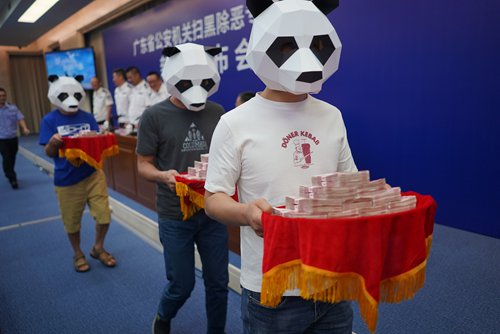
Whistleblowers who tipped off police about gangsters in South China's Guangdong Province collect their rewards on July 5, 2018. (Photo: VCG)
Chinese experts called for detailed implementation rules after the central government suggested the establishment of whistleblower systems to enhance public supervision channels and upgrade government reporting platforms in terms of market and safety supervision.
The whistleblower system was part of a guideline issued by the State Council on September 12 to reward and protect people who provide clues to serious illegal acts and major potential risks.
The move came three years after Shenzhen and Shanghai launched such systems to help protect food safety, according to which whistleblowers who report food-safety violations can be rewarded as much as 600,000 yuan (84,634) in Shenzhen and 300,000 yuan in Shanghai.
Shenzhen in South China's Guangdong Province this year also applied a similar system into management of the network lending industry.
"The whistleblower system makes use of moral sense and monetary incentive to encourage employees to disclose illegal acts by food companies and related departments," Zhu Yi, an associate professor of food security and nutrition at China Agricultural University in Beijing, told the Global Times on Wednesday.
The system could supervise every link of the production and sales process, reducing the costs for government management while enhancing public trust in food safety, Zhu said.
The system is also more specific and professional compared with other reporting platforms as whistleblowers only provide clues for specific careers and departments, according to Zhu.
Although it is the first time the central government planned a whistleblower system, whistleblowers actually have already been playing a role in cracking down on illegal acts, according to financial news website caixinglobal.com.
A veteran of one of China's largest vaccine manufacturers, Changsheng Life Sciences in Changchun, Northeast China's Jilin Province, reported the company for fabricating production records of rabies vaccine in July 2018, involving more than 210,000 children in East China's Shandong Province.
The tipoff led to the arrest of the company's chairman and punishment of 13 provincial officials. Zhu called for detailed implementation rules and guides.
"Detailed rules are urgently needed," she said. "The more detailed the better. To include all kinds of situations and make the system operable."
In response to web users' worries over rumors and false accusation, Zhu said that global experiences have suggested that the whistleblower system is serious and significant enough to contain rumors and false accusations.
According to the guideline, credit service agencies will be encouraged to launch credit rating and third-party evaluation in order to prevent false accusations and claims.
Professional agents like accountants, lawyers and tax organizations will also provide opinions for supervision and law enforcement.
Experts also suggested a high monetary reward for whistleblowers in order to encourage them to stand up while also strengthening the protection of their personal information and rights.
Wang Boxiao, a researcher at the Center for Coordination and Innovation of Food Safety of Renmin University of China in Beijing, suggested the government promptly conduct an investigation after receiving reports, and once verified, the reward should be issued as soon as possible, caixinglobal.com reported.
The US enacted the Whistleblower Protection Act of 1989 to protect employees from retaliation for reporting illegal activities. The US Department of Labor also launched a program to help whistleblowers facing retaliation.


